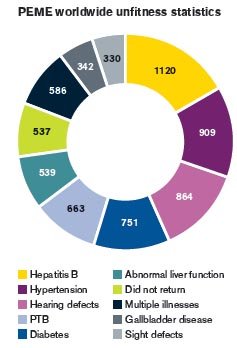
Dr. Balaji of Balaji Medical Centre, Chennai, India, explains why hepatitis B, a little known infection, kills more people worldwide than HIV/AIDS.
Every month the PEME programme team analyse the main causes of why crew fail the PEME. Over the last 20 years of the programme, hepatitis B has remained in the top ten illnesses found in crew. This illness, preventable by vaccination and safe health practice, has been discovered by the PEME programme to be the no.1 reason for unfitness. 9.6% of all crew who fail their medical are found to have hepatitis B.
PEME worldwide unfitness statistics
What is hepatitis B?
Hepatitis B is a serious disease caused by a virus that infects the liver, leading to lifelong infection, cirrhosis, hepatato- cellular carcinoma and liver failure.The Virus enters hepatocytes via blood. HBV can survive outside the body for at least 7 days.The incubation period is 6 weeks to 6 months (average 120 days)Why silent epidemic?
- A million people die each year from hepatitis B and its complications.
- 1 in 4 adults with chronic HBV will die from liver cancer or liver cirrhosis.
- Most people with HBV do not have any symptoms until it is too late.The main symptoms are fatigue, abdominal pain, and jaundice (yellow colouration of the skin).
Risks of contracting HBV
- When (i.e. medical attendants) treating patients who are carriers.
- When treated by persons (i.e. medical attendants) who are carriers.
- Unsafe medical practices using unsterile medical equipment.
- When handling clinical waste.
- Sexual contact at ports of call or onboard, i.e. homo and heterosexual.
- Intravenous drug abuse.
No studies are available to comment whether sexual or intravenous transmission onboard is higher than in the general populations.There have been no studies on transmission by, or, to healthcare workers on board, either.
Screening for hepatitis B
A battery of serological tests is used for the diagnosis of acute and chronic hepatitis B:
- HBsAG (included in PEME)
- HBsAB
- Anti-HBc IGG and IGM
- HBeAg
- Anti HBe
Prevention of the disease
Highly effective recombinant vaccines are available.Though it is not a mandatory requirement to work onboard, it is advisable for seafarers to be vaccinated against hepatitis B. It is also suggested to have a quantitative analysis of hepatitis B antibodies after vaccination.
Hepatitis B immunoglobulin (HBIG) can be administered within 48 hours of the incident involving hepatitis B exposure, and for neonates whose mothers are HBsAg and HBeAg positive.
Additional preventative measures
Screening of blood donors, safe sex using barrier methods, use of sterilised needles and other medical equipment.
Statistics
- Most healthy adults (90%) who are infected will recover and develop protective antibodies against future hepatitis B infections.
- 90% of infants and up to 50% of young children infected with hepatitis B will develop chronic infections.
- 2 billion people have been infected - 400 million people chronically.
- 10-30 million will become infected each year.
- According to WHO, worldwide, there are ten times more people with chronic HBV than HIV/AIDS, and HBV is 50-100 times more infectious than HIV.




